Welcome to my guide on one of the more elusive varieties of mushrooms, but also one of the tastiest: Morels.
What are morel mushrooms? Morels are some of the most sought-after mushrooms in the world. They have a delicious nutty taste and firm meaty texture. Even people who don’t normally enjoy mushrooms are usually willing to change their mind once they give morels a try.
In this guide, I’ll explain what morel mushrooms are, tell you where they grow and how to find them, how to cook them, how they can be grown, and more.
What Are Morel Mushrooms?
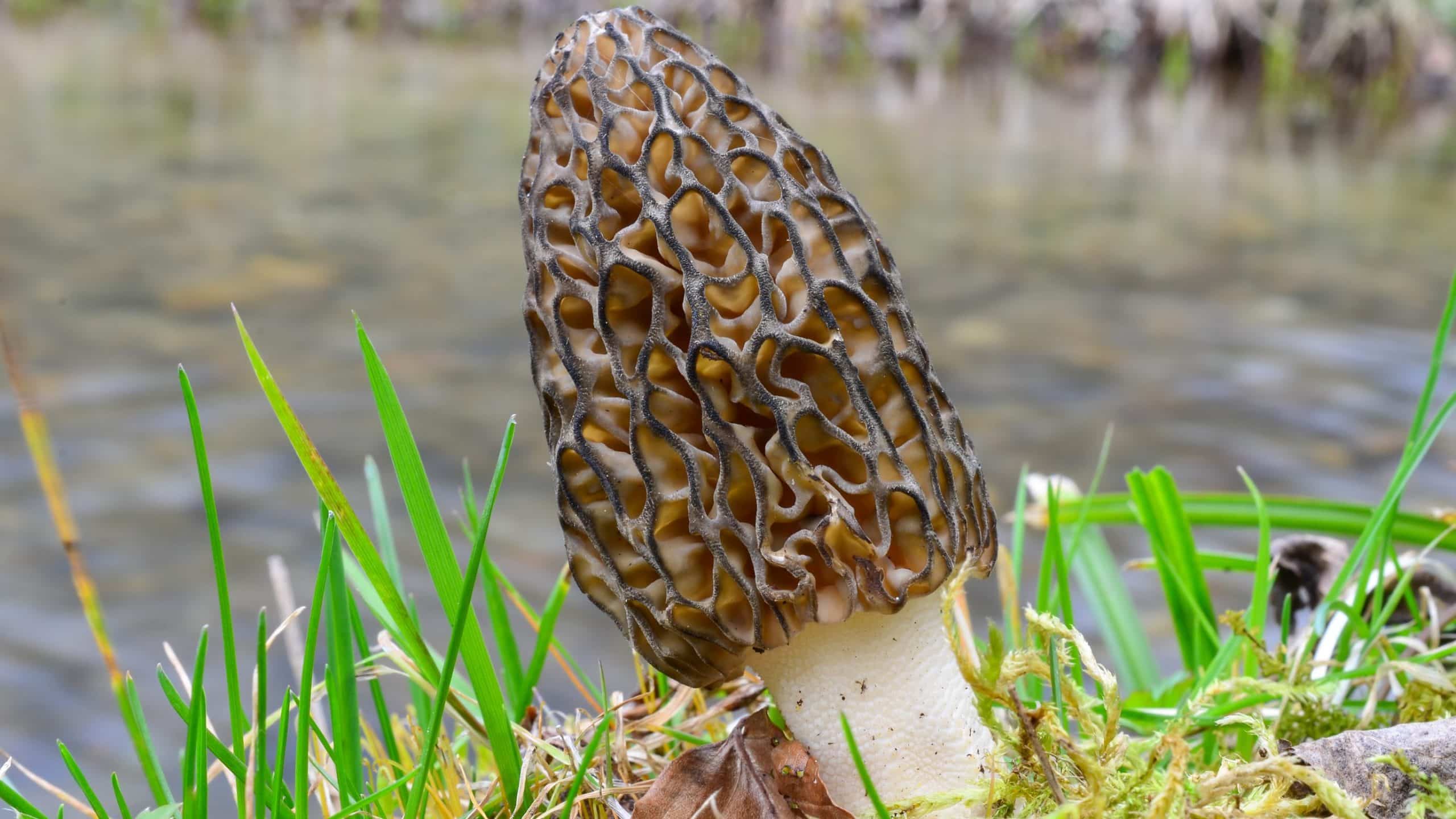
Morels are some of the most sought-after mushrooms in the world. In most cases they’re gathered from the wild, as opposed to farmed like portobello or oyster mushrooms.
Every spring, morel lovers, commercial hunters, and chefs head to the forests to find these delicious little treats.
Like all mushrooms, the part we eat is actually the fruit body of a larger underground structure called mycelium. In the case of morels, their mycelium has a complicated symbiotic relationship with trees.
Morels are quite delicious. Even people who generally don’t like mushrooms because they find the texture slimy or slippery will often love morels.
They have a unique meaty texture that’s different from other mushrooms, and have a nutty yet earthy flavor to them.
Aside from truffles, morels are probably some of the mushrooms with the biggest reputation and highest price tags.
Just like black truffles, they’re usually reserved for the fanciest of meals and enjoyed alongside other quality ingredients and fine wines.
How To Identify Morel Mushrooms
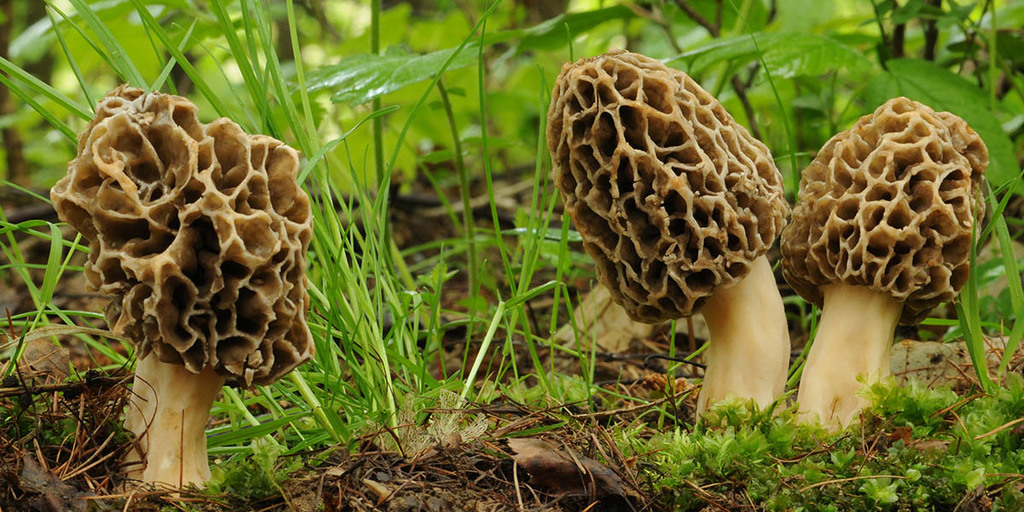
How morels look can vary a lot depending on where they’re growing, what kinds of soil or trees are around them, and other factors.
Some morels are short and stout, while others are long. They can range in color from grey to blonde. And they can be as big as your hand, or as small as a fingertip.
But what usually gives away morels is their honeycomb pattern on the outside. Inside, morels are whiteish and hollow with a goosebump texture.
If you cut into a false morel, it will be filled with cotton-like white fibers inside instead of being hollow.
When trying to distinguish real morels from some false morels, it’s important to make sure the base of the cap continuously runs into a whiteish stem. False morels hang freely off the stem.
Compared to lookalike mushrooms, true morels are more uniformly shaped. They are pitted inwards instead of bulging outward, false morels tend to look more bulgy and wavy.
Like every wild mushroom, you shouldn’t consume them unless you or someone you know is an expert at identifying them.
Never take a description or picture you saw on the internet to tell you that they’re definitively safe! If you have any doubts whether you’re looking at a real morel, just don’t eat it.
Where Do Morel Mushrooms Grow?
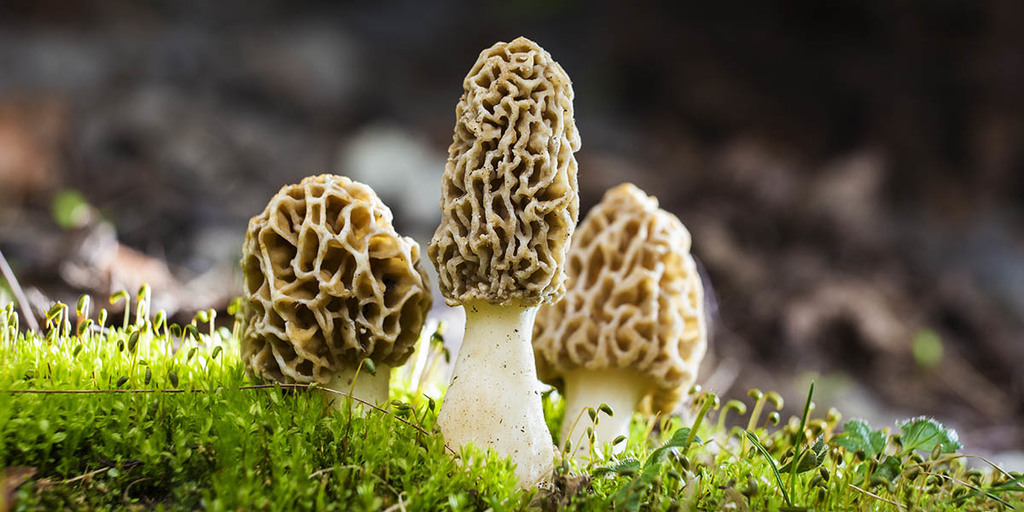
Morels can generally be classified as either fire morels or naturals.
Fire morels grow in great numbers in the spring after there has been a forest fire in the area in the previous year.
A July or August fire is ideal, although having a fire in an area is no guarantee that you’ll find morels the next year. But it’s a good thing to look for.
Fire morels like pine and spruce the best. They will grow most commonly on the outer edge of where a fire was, not in the middle of the area that was completely turned to ash.
Natural morels grow in orchards, meadows, and pastures, usually around trees. You might find a huge cluster of them in an area, enough to fill several baskets, or just a few isolated mushrooms.
They might only show up for one year, or possibly a couple of years and then suddenly not appear again the next without reason. This is what makes morels so sought-after and difficult to find.
Morels often grow between tree roots, in the shadow of fallen trees, or where the ground is covered in a bed of thick red needles from coniferous trees.
Morel mycelium starts producing when it’s stressed, such as because of forest fires. Other things that will stress the mushrooms out and cause them to fruit include digging or livestock.
But they will also fruit in the spring when trees begin to produce sap and bring up carbohydrates and energy from their roots.
Morels are one of the few species of mushroom that you want to start looking for in the spring.
On the West coast of the United States where it gets warmer a little earlier, April is a good time to start looking. In the prairie states where it takes a little longer to warm up, start looking in May.
Or let nature be your guide and start looking for morels once it looks like tree buds are starting to bloom.
As long as things don’t get too hot, morels will continue to fruit until into the middle of summer. At higher elevations or into dense coniferous forests, you may even find them occasionally into late summer.
- Read my full guide of How to grow mushrooms at home, even if you want to try to grow morel mushrooms.
How To Forage For Morel Mushrooms and Harvest Them
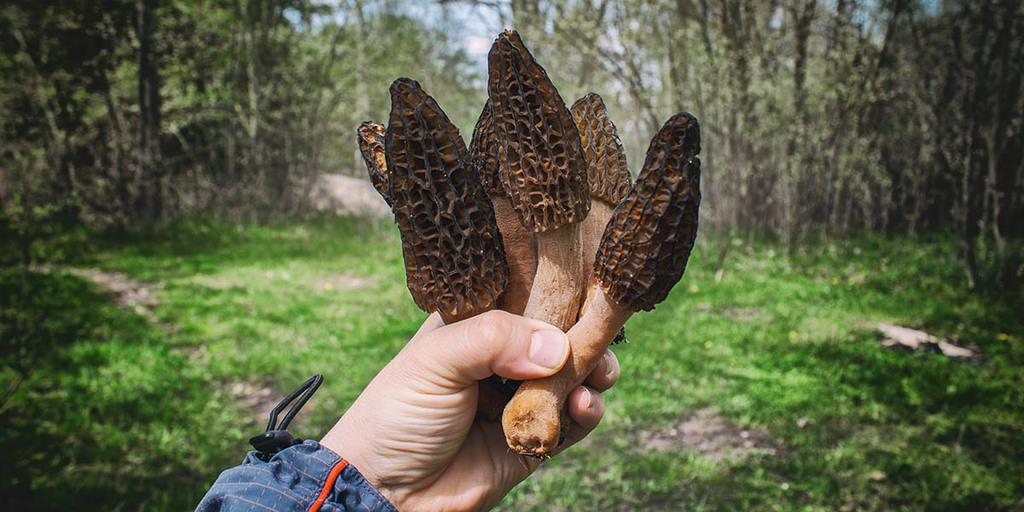
Foraging for morels can be something that you just do as a hobby to get enough for a few meals, or you can even make it into a seasonal source of income if you’re really good at it.
There’s an old saying that “morels are everywhere and impossible to find.”
But with the right knowledge about where to look and what to look for, you can dramatically increase your chances of finding some.
If you’re just getting started, the best way to learn how to hunt morels is to find somebody who already has the skill and learn from them.
Look for a mycological society or mushroom hunting group in your area if you can find one. They’re usually quite welcoming and willing to take new people who are eager to learn under their wing.
Once someone has helped you to confirm a true morel and you’ve picked them and sliced them open, you’ll be pretty confident in identifying them from then on.
Don’t have the opportunity to learn from somebody who already forages for morels? It’s still possible to learn on your own, but it will take more work.
The first thing you need to do is to start getting acquainted with nature. In the spring, when the trees start to bud, get out and take a look around.
Keep a journal and track anything that you think would be relevant, like the first day that trees started to bud, what the temperature is, and similar details.
It might be worth bringing along a camera to document things so you can refer back to them as well.
There are probably some mushroom foragers in your area who have accounts on social media like Instagram or Twitter. If you follow them, you might see a post that lets you know that they’re out looking for morels.
Pay close attention to their pictures and pick out details like what kind of trees, landscape, and soil is in the background.
Staying Safe While Foraging
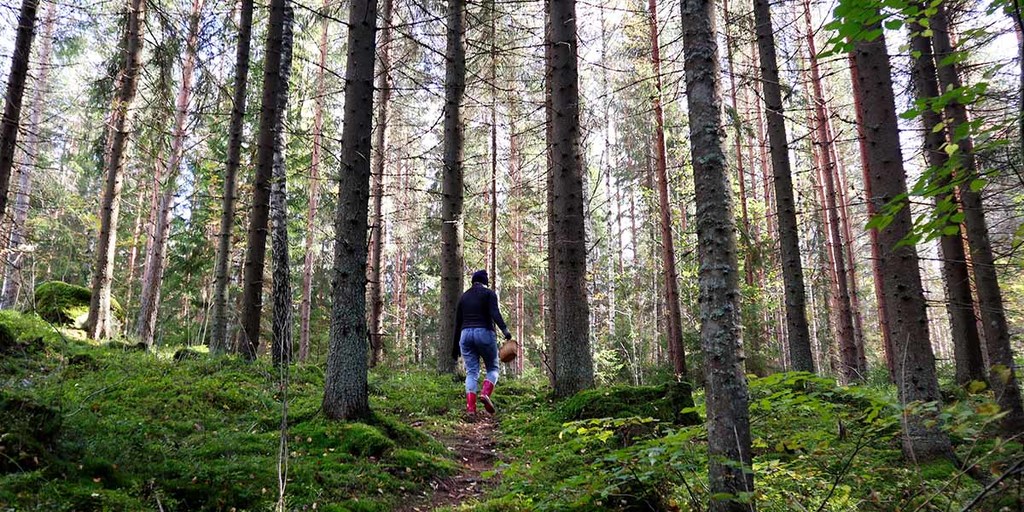
Safety should be of utmost importance, especially if you’re venturing off far into the woods. Ideally don’t go alone. But if you do, let people know where you’re going, and bring supplies.
Always have GPS, snacks, a first aid kit, bug spray, a lighter, and other survival basics, just in case you get stuck in the woods for whatever reason.
If you live in an area with dangerous wild animals, you are best packing bear spray or even bringing along a firearm, just in case you run into bears, cougars, or other large predators.
Don’t pick morels in industrial or urban areas where they can be contaminated with pollution and chemicals from traffic, industrial processing, etc. Whatever is in the soil will also be in the mushrooms.
Harvesting
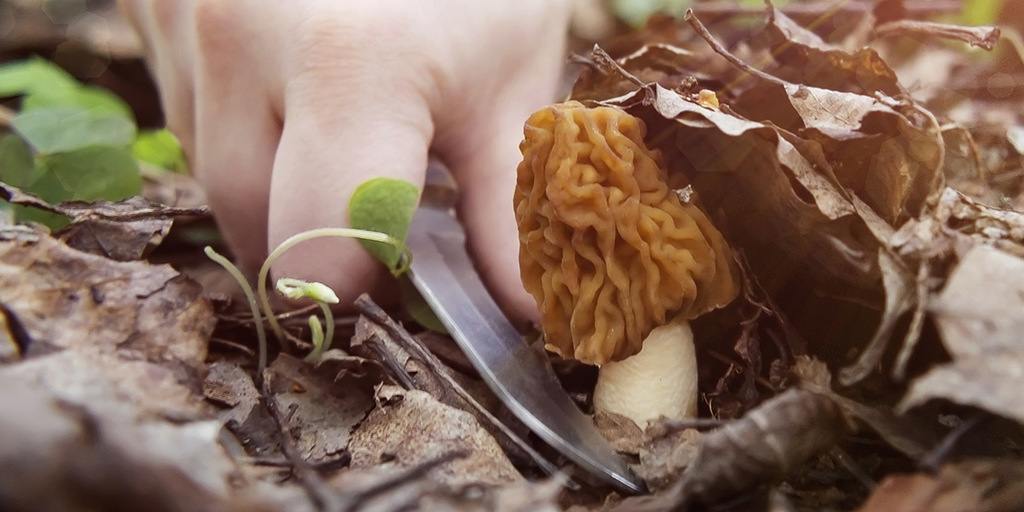
If you’re lucky enough to find a morel, use a small knife to cut it off. It’s best to only cut off an inch or so of the stem.
The entire stem is edible, but the more of it you cut, the more likely it is will be filled with dirt and sand toward the bottom, which makes it unpleasant to eat and more difficult to clean.
Morels are very fragile, so don’t put too many on top of each other or you’ll begin to bruise and squish them. Use woven baskets or containers with holes in them to allow for airflow.
You might want to cover your basket with a towel or some other kind of cloth to keep insects and other particles from getting in.
How To Grow Morel Mushrooms
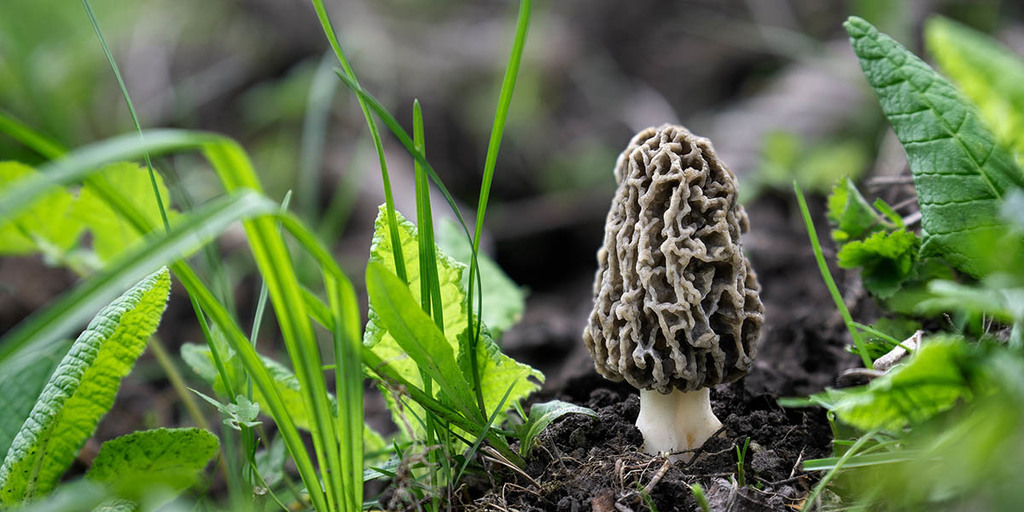
If you’re tired of hiking out into the wilderness in search of morels, you can attempt to grow some of your own in a more convenient location.
Growing morels in indoor conditions like oyster mushrooms are very difficult and not recommended for beginners.
Until recently, indoor cultivation was actually thought to be impossible. So instead, try to grow them outdoors.
The worst part of growing morels is that no matter what technique you use, it might be a couple of years before you start producing any mushrooms.
You might not be doing anything wrong, so don’t get discouraged. Just make sure the area is being kept moist and shady, and with some luck you’ll eventually have morels.
Feel free to repeat either of the techniques below each year until you get morels, as it will only boost your chance of success.
1. Make A Spore Slurry
If you’re already a mushroom hunter and have access to morels, you can use the spore slurry method to start growing some of your own.
A spore slurry is a mix of morel spores, sugar, salt, and water mixed together into a solution. This solution gets applied to wherever you want your morels to grow.
You’ll need at least a couple of mushrooms per gallon of water for this technique. It takes mushrooms to make mushrooms! Pick mature but fresh specimens that aren’t showing signs of rotting or going bad.
Start off with some non-chlorinated water in a large bucket. Add a pinch of salt and about a tablespoon of sugar (either white or brown will work) and mix it all up.
The salt keeps other bacteria from growing, while the sugar provides nutrients for the spores.
Add in your mushrooms and let them sit for 1 or 2 days at room temperature. If you’re worried about bacterial contamination, just do it for 24 hours.
You can break the mushrooms up or not, the spores are on the outside of the morel so it doesn’t make a huge difference.
After enough time has passed, you can remove the mushrooms and you’ll be left with a solution that has millions of morel spores in it.
Pour this liquid over a bed of wood chips, ash, or peat moss mixed with sandy soil. Putting it at the base of a tree is best, particularly if you have an elm tree nearby, that’s your best bet.
2. Grow From A Kit
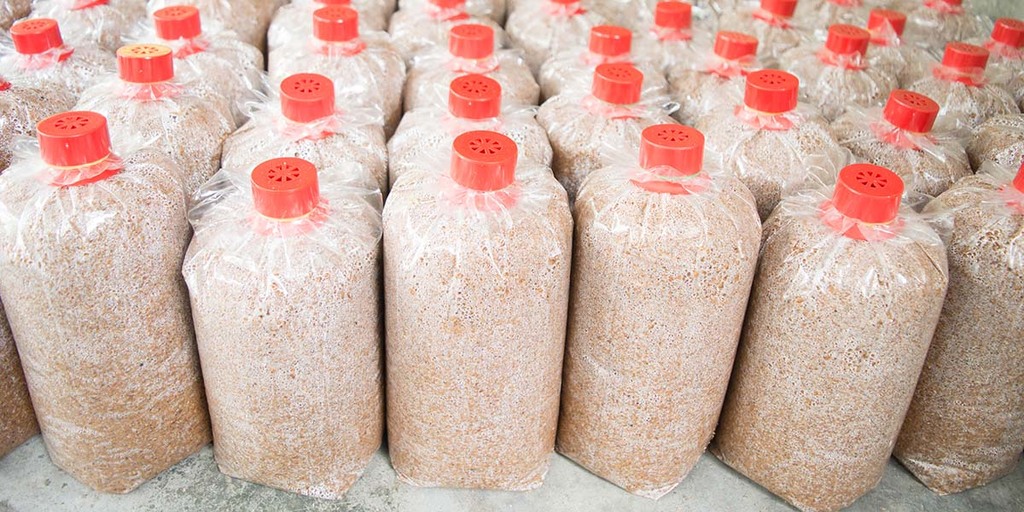
Growing from a kit is more reliable, since mycelium is more established than spores and more likely to take root. The downside is that you’ll have to purchase it, so this isn’t a free option.
Morel spawn can come in a variety of forms such as on woodchips, sawdust, or rye berries.
Morel kits can be purchased online and come with spawn and instructions on how to grow it. But the basic idea will be as follows:
-
Make a bed for your morels between summer and fall.
-
Pick a shady spot and set out an area that’s about 3 feet by 3 feet, depending on the size of your kit.
-
You’ll need to create a sandy soil that drains well, without too many rocks or clay.
-
Adding wood ashes can help, since we know that morels tend to thrive in areas that have been affected by forest fires. A bed near elm, apple, tulip, or ash trees will have the best chance of success, since morels have a symbiotic relationship with the roots of these trees.
-
Try to mix some woodchips from these varieties into the soil if possible too.
-
Once your soil is all prepped, all you need to do is mix your spawn into the prepared bed and spread it around evenly.
3. Inoculating Trees
The last method for growing morel mushrooms is to innoculate the roots of trees that morels often grow near. You can do this by using the slurry method described above near the base of an ash or elm tree.
Alternatively, with young trees you can mix mushroom spawn into the roots of trees while planting.
You can also purchase baby trees that have been pre-inoculated with morel spores or spawns already. Like every other method, expect to wait several years to get results.
How To Store Morel Mushrooms
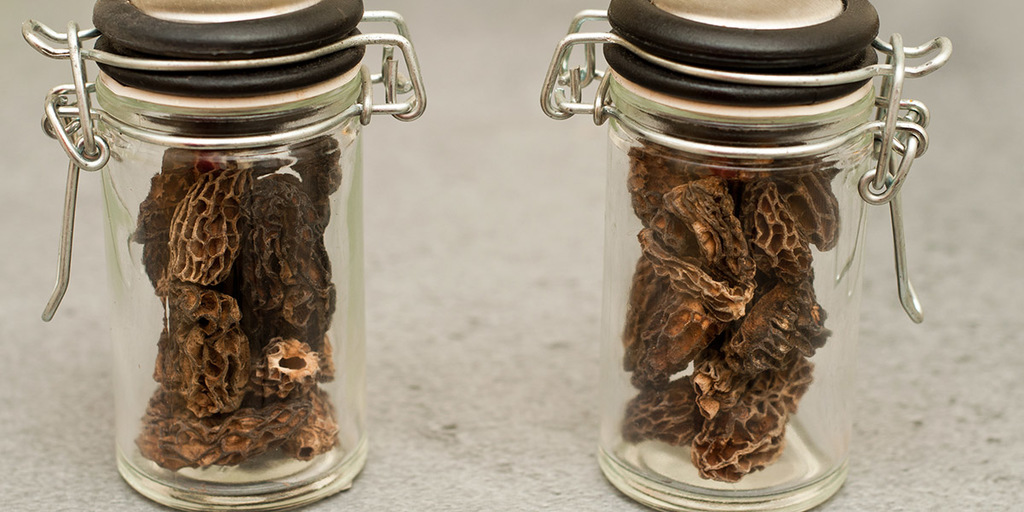
Fresh morels will keep in the refrigerator for about a week. The more moisture they contained when being picked, the quicker they will start to break down.
Be sure to give them lots of circulation, or dry them out if you’re worried about them deteriorating too quickly.
If it’s a sunny day, you can simply lay morels out on a screen and allow them to dry in the sun. Just give them lots of airflow and flip them over periodically.
If you’re not able to sun-dry them, you’ll have to experiment with using a food dehydrator, oven, or other drying technique.
Drying morels is more of an art than a science, and will largely depend on the size and moisture content of the mushrooms. So, unfortunately, I can’t just give a standard temperature and length of time to dry them for.
Rehydrating your dried morels, on the other hand, is simple. Just add some water to them in a bowl, and in a few minutes, they’ll bounce right back and be ready to use.
- Learn more about How long do mushrooms last and what you can do to keep them fresh.
What Do Morel Mushrooms Taste Like?
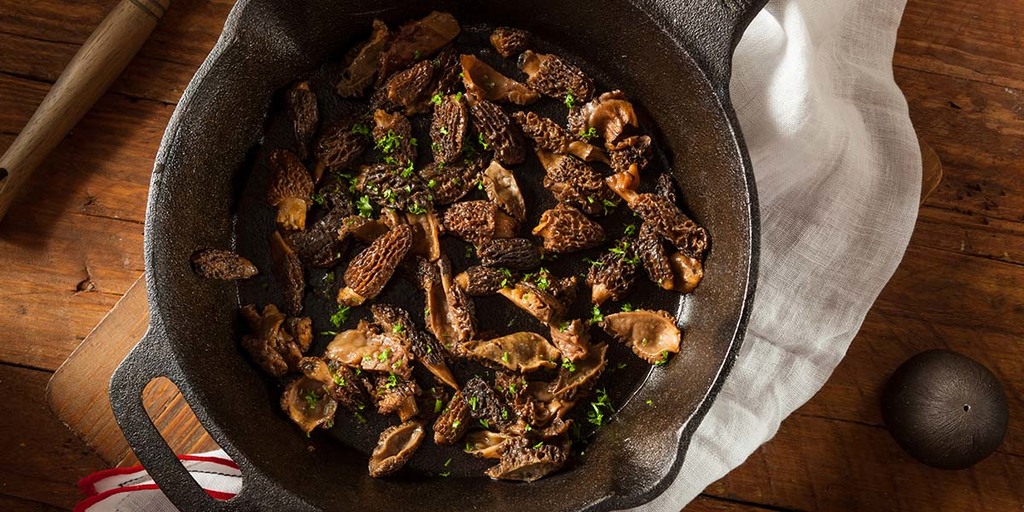
Morels taste like, well, morels! Just like black truffles, or a lot of other foods with unique tastes, it’s difficult to put the taste into words.
Words that people generally use to describe morels include nutty, woodsy, toasted, and earthy. They have a very deep flavor, but it’s not strong and distinct in a bad way.
They don’t overpower recipes they’re incorporated into, but they do really seem to stand out, and you can tell that they’re present.
The texture of morels isn’t chewy or squishy, which is how some people describe other types of mushrooms. Instead, they have a meaty texture, but they’re also tender at the same time.
Aside from tasting great, morels are full of nutritional benefits too. They’re full of lots of protein and fiber, as well as antioxidants. They can even help to balance your blood sugar.
Since morels grow in rich soils, they’re full of vitamins and minerals like copper, iron, manganese, zinc, vitamin D, folate, riboflavin, niacin, and more. They even contain a bit of calcium, selenium, and potassium.
How To Cook Morel Mushrooms
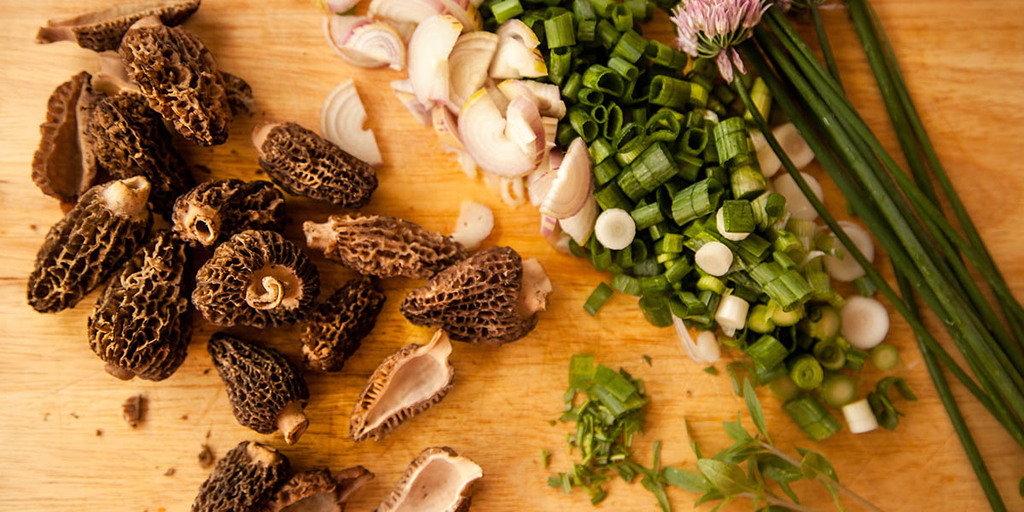
Morels have such a nice flavor that cooking them is best kept as simple as possible. That way you can savor their excellent taste fully. Real morel lovers even shun the idea of using salt or olive oil.
You absolutely do need to cook them though. Raw morels can cause cramps and digestive upset, and they simply don’t taste good uncooked.
Personally I like to sautee morels with a bit of butter. Cook them at a low temperature slowly until they start to develop a nice color, and then they’re done.
Some people cook them in cream or wine. Or even eat them fried, stuffed, or breaded. The possibilities are really endless, and it all depends on what appeals to your palette.
Eat them the way that you enjoy them, and don’t let anyone tell you that you’re wrong!
If you’re cooking with dried morels instead of fresh, you’ll need to soak them first.
Conclusion
Morels are one of the most delicious mushrooms out there. But unfortunately, they’re also elusive in nature, as well as very difficult to grow indoors in a commercial setting.
Your best shot is to get out into nature and try to find them in areas with lots of elm or ash trees, particularly spots where there was a forest fire the year before.
Be sure that you can positively identify a morel before attempting to eat it. If it’s hollow inside and doesn’t have a stem that connects up through the cap, that’s a good starting point. But always consult an expert first.
If you want to try growing morels for yourself, you can try making a spore slurry or buying a kit online. But expect to wait at least a couple of years before you start to see morels appear.
If you want to learn more about growing mushrooms, then read these guides:
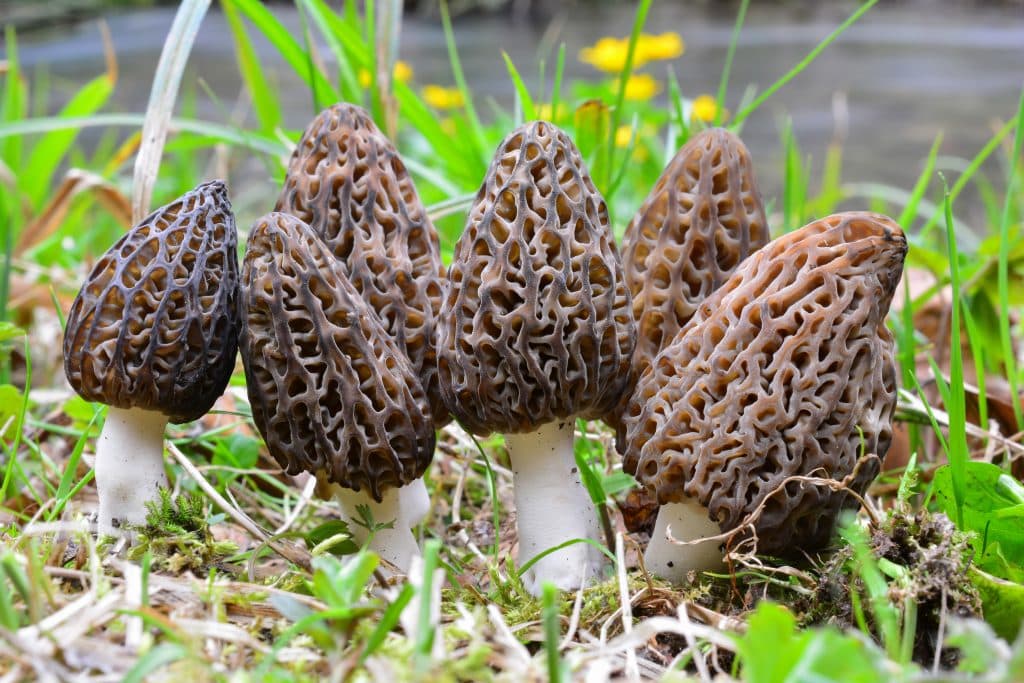
Would like to know more